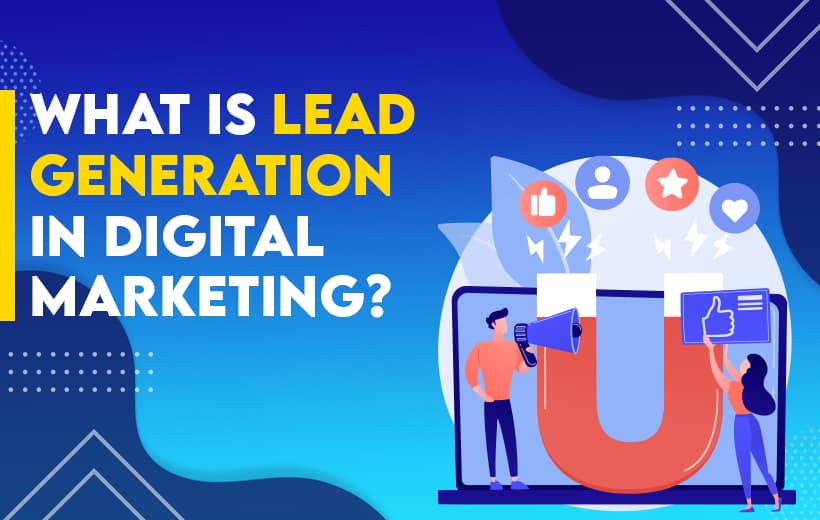Lead Generation in Digital Marketing
In the fast-paced world of digital marketing, lead generation plays a big role in driving business growth and success. It’s all about capturing potential customers, known as leads, and turning them into qualified prospects who are more likely to buy from you. Lead generation involves using different strategies and techniques across digital platforms to attract, nurture, and convert leads. In this article, we’ll dig deeper into the lead generation in digital marketing and explore its importance in today’s competitive business world.
Understanding the Power of Lead Generation
In the vast ocean of digital marketing, lead generation guides businesses to find their target audience and build connections. By using effective lead generation strategies, businesses can identify people who are interested in their products or services and collect their contact information for further communication. This allows businesses to directly communicate with potential customers, build relationships, and guide them through the sales process with personalized content.
The Lead Generation Process
The lead generation process has several stages aimed at moving prospects closer to becoming customers. Let’s explore these stages:
Attracting Potential Leads
The first step in lead generation is attracting potential leads to your digital marketing channels. This can be done through various techniques, such as:
- Optimizing your website and content to appear higher in search engine results, increasing visibility and driving organic traffic.
- Running targeted ad campaigns on search engines and social media platforms to drive traffic and generate leads.
- Creating valuable and engaging content like blog posts, videos, and infographics to attract and engage your target audience.
- Using popular social media platforms to raise brand awareness, engage with users, and drive traffic to your website.
Capturing Lead Information
Once potential leads are attracted to your digital channels, it’s important to capture their contact information. This is typically done through lead capture forms, landing pages, or offering valuable content in exchange for their details. For example, you can offer a free ebook, webinar registration, or newsletter subscription to entice prospects to provide their information willingly.
Nurturing and Engaging Leads
After capturing leads, the next step is nurturing and engaging them through targeted marketing campaigns. This involves delivering personalized and relevant content that addresses their needs, educates them about your products or services, and builds trust. Email marketing, social media engagement, and marketing automation are important tools in this stage, allowing businesses to send timely and tailored messages to their leads.
Converting Leads into Customers
The ultimate goal of lead generation is to convert leads into paying customers. This is achieved by implementing effective conversion strategies, such as:
- Offering compelling discounts or promotions to encourage purchase.
- Providing clear and concise product or service information that addresses potential concerns.
- Providing a seamless and user-friendly purchasing experience.
- Using persuasive call-to-action buttons and landing pages.
The Significance of Lead Generation in Digital Marketing
Lead generation is crucial for any digital marketing strategy as it drives business growth and profitability in multiple ways:
· Business Growth and Expansion
- By consistently generating a steady stream of qualified leads, businesses can fuel their growth and expand their customer base. With more potential customers in the sales pipeline, the chances of conversion and revenue generation increase significantly.
· Cost Efficiency
- Compared to traditional marketing methods, lead generation in digital marketing offers a more cost-effective approach. By targeting specific demographics, interests, and behaviors, businesses can optimize their marketing efforts and focus on the most relevant prospects, avoiding wasteful spending on uninterested individuals.
· Data-Driven Decision Making
- Lead generation provides valuable data and insights about the target audience. By analyzing lead behavior, preferences, and engagement patterns, businesses can make informed decisions to optimize their marketing strategies, refine their messaging, and enhance the overall customer experience.
· Customer Relationship Building
- Effective lead generation strategies not only attract potential customers but also nurture relationships and build trust over time. By providing valuable content, personalized interactions, and exceptional customer experiences, businesses can establish long-term relationships with their customers, fostering loyalty and advocacy.
Conclusion
Lead generation is the backbone of successful digital marketing campaigns, enabling businesses to identify, engage, and convert potential customers into loyal patrons. By employing a well-rounded lead generation strategy, businesses can optimize their marketing efforts, boost conversions, and achieve sustainable growth. Understanding the power and significance of lead generation in the digital landscape by taking our online digital marketing course.
If you are a business owner and want to gain more leads for your business you can hire us as your digital marketing agency, provide you with a result-driven lead generation service. It is essential for any business who aiming to thrive in today’s competitive market, so don’t be late contact us now.
FAQs
How long does it take to see results from lead generation efforts?
The time to see results from lead generation efforts varies depending on factors like industry, target audience, and marketing strategies. While some businesses may see results within a few weeks, others may take several months of consistent effort. It’s important to remember that lead generation is an ongoing process that requires continuous optimization and adaptation.
Are there any ethical considerations in lead generation?
Yes, ethical considerations are important in lead generation. It’s crucial to obtain consent from individuals before capturing their personal information and handling their data responsibly. Additionally, businesses should focus on providing valuable and relevant content, avoiding misleading or deceptive tactics to attract leads.
How can I measure the effectiveness of my lead-generation campaigns?
Measuring the effectiveness of lead generation campaigns involves tracking metrics like the number of leads generated, conversion rates, cost per lead, and return on investment (ROI). By monitoring these metrics and analyzing the data, businesses can gain insights into their campaign performance and make data-driven decisions for improvement.





